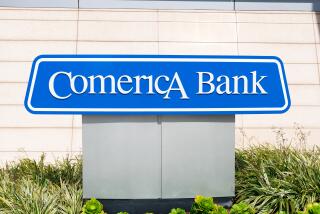Banks Losing Credibility, Chief Regulator Says : Finance: The industry faces total restructuring if it doesn’t act quickly to restore consumers’ confidence, Robert Clarke contends.
- Share via
ORLANDO, Fla. — In an unusually harsh speech, the nation’s chief regulator of national banks said Tuesday that the industry is “drawing down its credibility” for failing to own up quickly to loan problems and losses.
In a speech to the American Bankers Assn. annual convention here, Comptroller of the Currency Robert L. Clarke warned that unless that credibility is restored soon, bankers face ominous actions from Congress, perhaps even legislation creating a new banking system.
“Bankers don’t have a reservoir of public goodwill from which to draw,” Clarke said. “This is a harsh assessment, I recognize, but this is not a time to be kidding ourselves.”
Clarke said the failure to face up to loan problems quickly has cost banks their credibility with investment analysts, stockholders and investors. “As a result, Wall Street has little faith in what the banks report,” he said.
Clarke said banks also have lost credibility with Congress and the General Accounting Office, Congress’ investigative arm. And he warned that taxpayer anger over the savings and loan bailout could spill over into banking, even though it is not fair to banks to compare the industry’s problems to the deeper troubles of thrifts.
“In politics, and in Washington, it does not matter whether the perception of the banking industry is fair or not,” Clarke said.
Clarke’s message was sobering for the convention, which has largely ignored many of the severe economic conditions, such as the nation’s softening real estate markets, facing banking today.
Clarke’s speech especially unnerved the bankers’ association, the industry’s main trade group. A spokesman for the association, Mark Serepca, confirmed that its staff suggested that Clark temper his remarks after seeing a draft copy of his speech on Monday.
“They suggested that it be made less negative,” Serepca said.
L. William Seidman, chairman of the Federal Deposit Insurance Corp., gave a more optimistic speech, although he said the erosion in the fund that insures bank deposits will not improve soon.
In a meeting with reporters, Seidman said he agrees with Clarke’s assessment. “Everything he said is accurate,” Seidman said.
Bankers interviewed after Clarke’s speech applauded his candor.
“It’s the truth. He’s telling it like it is,” said Roger O. Johnson, president of First National Bank in Fergus Falls, Minn. Marvin E. McDonald, president of Benton County Bank in Corvallis, Ore., described Clarke’s speech as “a good wake-up call.”
Virtually unknown outside of banking a year ago, Clarke has emerged as an outspoken critic of what he believes were sloppy bank lending practices in the 1980s.
Clarke, who is expected to be renominated soon for a new five-year term, has especially criticized the aggressive lending by some banks to developers of office buildings, shopping centers, hotels, housing developments and other commercial projects, a business considered highly cyclical.
Many of those loans are coming back to haunt banks as borrowers default. In many cases, Clarke’s examiners have forced banks to recognize the loans as bad and to set aside more money to cover potential losses.
Clarke urged bankers to get back to basics, maintain strong capital--banks’ financial cushion against losses--and avoid an over-concentration of loans in particular industries and sectors, such as real estate. “Don’t cut corners,” he said.
The banking industry’s slipping image was one of the main subjects of a private meeting Monday between the trade group’s officers and the nation’s three top banking regulators--Clarke, Seidman and Federal Reserve Chairman Alan Greenspan.
Security Pacific Corp. Chief Executive Robert H. Smith reportedly was one of the most vocal bank executives at the meeting.
In an interview, the Los Angeles banker declined to discuss what was said at the meeting. Smith did say he and other bankers are concerned that public confidence in banks is suffering from “totally unwarranted” comparisons of bank troubles with the savings and loan debacle that are sometimes made in Washington and in the media.
“A bank is not a thrift and never will be,” Smith said.
More to Read
Inside the business of entertainment
The Wide Shot brings you news, analysis and insights on everything from streaming wars to production — and what it all means for the future.
You may occasionally receive promotional content from the Los Angeles Times.










